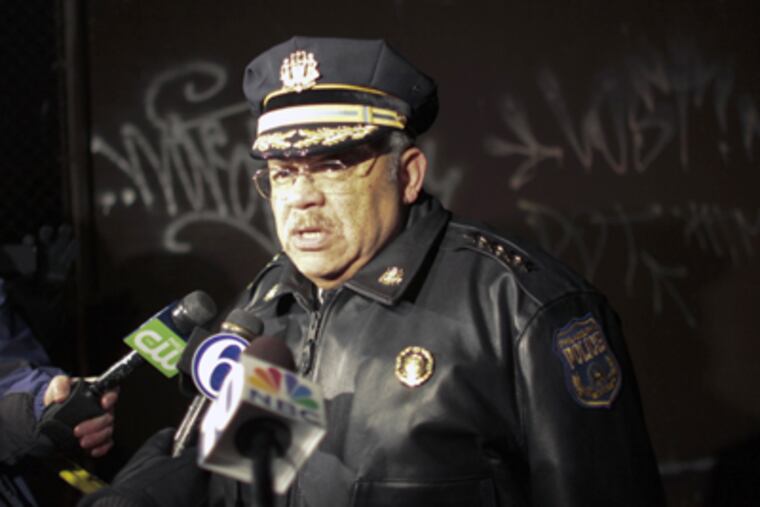Violent crime fell 3 percent in Philadelphia in 2010
Violent crime in Philadelphia dropped 3 percent and property crime rose 4 percent in 2010, consistent with the trend in major cities but a departure from the double-digit declines of recent years.

Violent crime in Philadelphia dropped 3 percent and property crime rose 4 percent in 2010, consistent with the trend in major cities but a departure from the double-digit declines of recent years.
Police Commissioner Charles H. Ramsey cited a number of factors, including the city's financial crisis, that led to the slashing of overtime and the elimination of two Police Academy classes.
"I think that it was a challenging year," said Ramsey, whose first two years as the city's top cop brought impressive drops in violent crime, including double-digit decreases in homicides and robberies. Homicides this year stood at 304 as of Wednesday, one short of the total in 2009.
"We wanted to cut again. We wanted to get under 300," Ramsey said, noting that the city was "still significantly under where we were."
Philadelphia's crime numbers are consistent with the trends of large cities. In June, the last time nationwide data were made available, Philadelphia had registered a 6 percent drop in violent crime over the same period in 2009.
Violent crime - including murder, rape, robbery, and aggravated assault - fell 6.2 percent nationwide in cities of more than 100,000 people.
After a hot, violent summer, Philadelphia was set to end the year with a 3 percent drop in violent crime. Nationwide numbers for all of 2010 were not available.
The increase in property crime this year was due largely to an increase in thefts.
In any case, Ramsey said looking at trends over five- and 10-year periods was "a more accurate way of measuring whether you're making the kind of progress you need to make."
"When you start to compare one year to the other, I don't think that you can say that a city is more dangerous or safer," he said. "It's going to become more and more challenging year to year, because you're going against better numbers."
Since the crack cocaine epidemic of the late 1980s and early 1990s, Philadelphia again matches the national trend of falling homicide rates.
Throughout the 1990s, Philadelphia averaged more than 400 homicides a year, topping out with 497 in 1990. In the 2000s, the city topped 400 homicides just once, with 406 in 2006.
The city has had fewer than 300 homicides just twice in the last 20 years - 296 in 1999 and 288 in 2002.
Ramsey said the goal for 2011 would be to break the 300 barrier again, and to reduce the number of nonfatal shootings in the city.
He said Philadelphia still has the highest rate of gun violence among major cities. Though gun robberies fell 9 percent in 2010, aggravated assaults with a gun jumped 5 percent.
"Obviously, that's troubling," Ramsey said. "As long as we got as many guns in our society as we have and people with violent histories returning to the streets, what do you expect?"
Ramsey is a proponent of so-called smart policing, such as mapping crime trends and deploying extra manpower in high-crime areas at high-crime hours.
He said those tactics were particularly important in 2010, when resources were limited. The department is now short 143 officers from its authorized strength of about 6,500.
On any given day, an additional 500 officers are unavailable for duty because of injuries, medical issues, Internal Affairs investigations, and other issues.
Ramsey said that if the department cannot hire in 2012 - he hopes to get an academy class when the new fiscal year begins in July - then some reorganization might be necessary.
"That's just the way it is. I'm not complaining about it. It just makes the job a little more challenging," he said. "Despite all that, we were able to stay pretty much where we were last year."